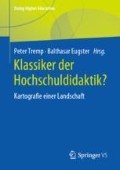Zusammenfassung
„Classroom Assessment Techniques“ von Thomas A. Angelo und K. Patricia Cross ist ein Kompendium, das 50 unterschiedliche Techniken anbietet, mithilfe derer Lehrende effektiv und prozessnah Informationen über Lernstand, Lernfortschritte und Rückmeldungen ihrer Studierenden einholen können. Der seit 1993 in zweiter Auflage vorliegende Band bettet diese Techniken in einen 10-schrittigen Zyklus ein, in dem Lehrende angelehnt an Forschungs- oder Evaluationsprozesse systematisch und evidenzbasiert ihre Lehre verbessern sollen. Das Kapitel stellt Ausgangsprämissen, Ziele, Konzept und wesentliche Inhalte des Bandes vor. Unter Bezug auf hochschuldidaktische Diskurse zur Scholarship of Teaching and Learning (SoTL) sowie etablierte Qualitätskonzepte wie die Selbstevaluation wird eine Einordnung des Bands als potenzieller „Klassiker“ der Hochschuldidaktik vorgenommen.
Access this chapter
Tax calculation will be finalised at checkout
Purchases are for personal use only
Literatur
Angelo, T. A., & Cross, K. P. (1993). Classroom assessment techniques. A handbook for college teachers (The Jossey-Bass higher and adult education series, 2. Aufl.). San Francisco: Jossey-Bass. http://www.loc.gov/catdir/bios/wiley043/92033901.html.
Beywl, W., Bestvater, H., & Friedrich, V. (2011). Selbstevaluation in der Lehre. Ein Wegweiser für sichtbares Lernen und besseres Lehren. Münster: Waxmann.
Cross, K. P., & Steadman, M. H. (1996). Classroom research. Implementing the scholarship of teaching (Jossey-Bass higher and adult education series). San Francisco: Jossey-Bass.
Hattie, J. (2008). Visible learning. A synthesis of over 800 meta-analyses relating to achievement. London: Routledge.
Hense, J. U. (2006). Selbstevaluation. Erfolgsfaktoren und Wirkungen eines Ansatzes zur selbstbestimmten Qualitätsentwicklung im schulischen Bereich (Europäische Hochschulschriften. Reihe XI, Pädagogik, Bd. 933). Frankfurt: Lang.
Hense, J. U. (2010). Nutzen und Nutzung von Evaluation zur Unterrichtsverbesserung. In W. Schönig, A. Baltruschat, & G. Klenk (Hrsg.), Dimensionen pädagogisch akzentuierter Schulevaluation (S. 125–144). Baltmannsweiler: Schneider Hohengehren.
Huber, L. (2014). Scholarship of Teaching and Learning: Konzept, Geschichte, Formen, Entwicklungsaufgaben. In L. Huber, A. Pilniok, R. Sethe, B. Szczyrba, & M. Vogel (Hrsg.), Forschendes Lehren im eigenen Fach. Scholarship of Teaching and Learning in Beispielen (Blickpunkt Hochschuldidaktik, Bd. 125, 1. Aufl., neue Ausg, S. 19–36). Bielefeld: Bertelsmann.
Johnson, K., Greenseid, L. O., Toal, S. A., King, J. A., Lawrenz, F., & Volkov, B. (2009). Research on evaluation use: A review of the empirical literature from 1986 to 2005. American Journal of Evaluation, 30(3), 377–410. https://doi.org/10.1177/1098214009341660.
Kordts-Freudinger, R., & Leschke, J. (i. d. B.). „Transforming and extending knowledge“. In Ernest L. Boyers (Hrsg.), Scholarship reconsidered. Priorities of the professiorate. New Jersey: Princeton University Press.
Pawson, R., & Tilley, N. (1997). Realistic evaluation. London: SAGE.
Perry, R. P., & Smart, J. C. (Hrsg.). (2007). The scholarship of teaching and learning in higher education. An evidence-based perspective. Dordrecht: Springer.
Trigwell, K., Martin, E., Benjamin, J., & Prosser, M. (2000). Scholarship of teaching: A model. Higher Education Research & Development, 19(2), 155–168. https://doi.org/10.1080/072943600445628.
Author information
Authors and Affiliations
Corresponding author
Editor information
Editors and Affiliations
Rights and permissions
Copyright information
© 2020 Springer Fachmedien Wiesbaden GmbH, ein Teil von Springer Nature
About this chapter
Cite this chapter
Hense, J.U. (2020). Studentisches Lernen und das eigene didaktische Handeln besser verstehen. Classroom Assessment Techniques von Thomas A. Angelo und K. Patricia Cross als Plädoyer und Anleitung für die Selbstevaluation der eigenen Lehre. In: Tremp, P., Eugster, B. (eds) Klassiker der Hochschuldidaktik?. Doing Higher Education. Springer VS, Wiesbaden. https://doi.org/10.1007/978-3-658-28124-3_14
Download citation
DOI: https://doi.org/10.1007/978-3-658-28124-3_14
Published:
Publisher Name: Springer VS, Wiesbaden
Print ISBN: 978-3-658-28123-6
Online ISBN: 978-3-658-28124-3
eBook Packages: Education and Social Work (German Language)

